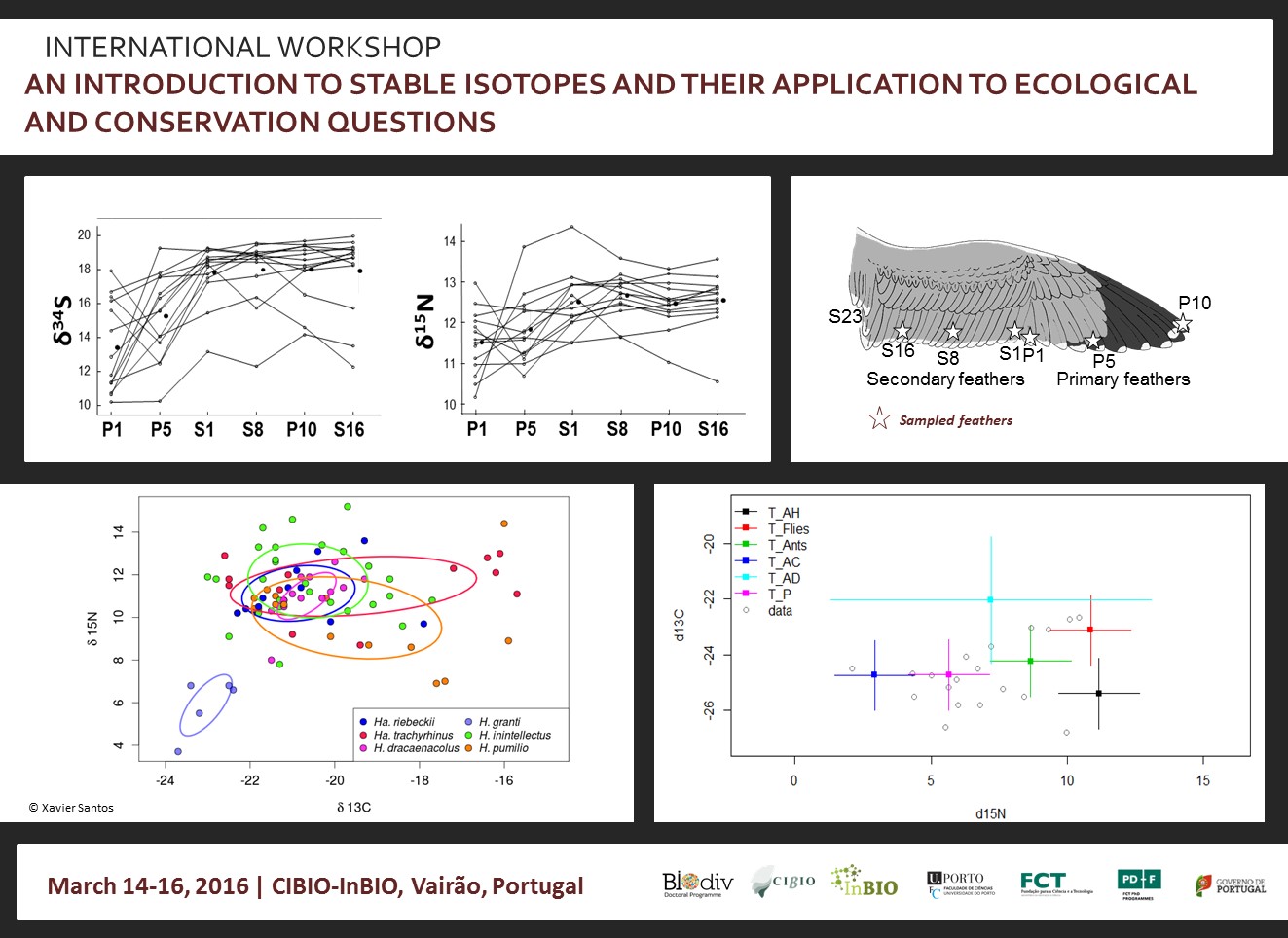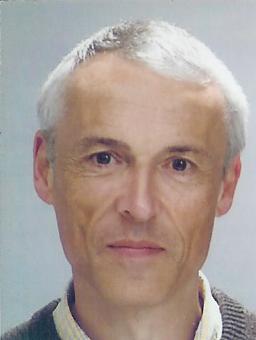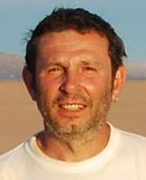ADVANCED COURSE: AN INTRODUCTION TO STABLE ISOTOPES AND THEIR APPLICATION TO ECOLOGICAL AND CONSERVATION QUESTIONS

The analysis of animal’s diet is central to many questions in ecology and evolution. Based on the assumption that “you are what you eat”, stable isotope analysis (SIA) is an alternative approach to more conventional methods in complex communities. It is a widespread tool in studies of diet composition, trophic interactions, habitat use and migration. SIA has been used to study temporal and spatial variation in food web structure, interspecific niche partitioning, habitat connectivity and individual specialization. Its application to conservation and evolutionary issues has been also explored.
This course aims at providing an introduction to the basic principles of stable isotopes and its potential application to multiple studies within an ecological and evolutionary context. It will provide an overview of the rules underlying stable isotope analyses and use of the commonest R packages to analyze and discuss real stable isotope datasets. A basic previous knowledge of R is required.
This course, is directed towards PhD and master students interested in exploring the potential of stable isotope analyses to be applied in their own research. The course is designed to be organized in three days: two days exclusive to a maximum of 20 students with the objective to teach basic principles of stable isotopes and one day open to all CIBIO-InBIO community with two invited talks and 4 flash talks by CIBIO-InBIO researchers that currently are using SIA in their research.
SCHEDULE
DAY 1. March 14, 2016 (Room 2)
9:30 - 11.15
Introduction to isotope research, rules, and caveats
11.15 - 13.00
Applications of isotopes to ecology and evolutionary questions
14:30 - 17:30
Presentation of packages for isotope analysis
DAY 2. March 15, 2016 (Auditorium)
9:30 - 11:00
Invited Talk 1. Stable isotopes document the foraging ecology of seabirds and marine mammals from the Southern Ocean, by Dr. Yves Cherel (CNRS-Université de La Rochelle, France)
11.30 - 13.00
Invited Talk 2. Tracing bird ecology through feathers: ecological applications of stable isotope analysis, by Dr. Raül Ramos
(University of Barcelona, Spain).
15.00 - 17.00
Flask Talks:
- Stable isotopes help tracing bird movements and compare food webs along a migratory flyway, by Ricardo Jorge Lopes (CIBIO/InBIO, Portugal)
- Disentangling the isotopic map of the Socotran reptiles: from island-wide samples to biological conclusions., by Eudald Pujol-Buxó (University of Barcelona, Spain)
- How an alien species adapt? A case study with insular Podarcis sicula, by Iolanda Rocha (CIBIO/InBIO, Portugal)
- Primary consumers enhance connectivity to marine and terrestrial ecosystems within estuarine food webs, by Ester Dias (CIIMAR, Portugal)
- The use of isotopes for conservation: the case study of Crocodylus suchus in Mauritania, by Xavier Santos (CIBIO/InBIO, Portugal)
In this day, the sessions will be open to the participation of all CIBIO-InBIO members.
DAY 3. March 16, 2016 (room 2)
9:30 - 13.00
Practical class with real data sets. Students are invited to use data sets and run statistical packages
14:30 - 17:30
Student presentations and discussion
WORKSHOP INSTRUCTORS
|
Dr. Yves Cherel, CNRS-Université de La Rochelle, France
|
|||
 |
Dr. Yves Cherel is Directeur de Recherche at the Centre d’Etudes Biologiques de Chizé (CNRS-Université de La Rochelle, France). He wintered at the Crozet Islands (southern Indian Ocean) in 1982 during which he studied the metabolic adaptations to long-term fasting of penguins. Since 25 years, he works on trophic interactions and feeding strategies of top marine predators, and thus on the food web structure of the pelagic ecosystem, focusing on the Southern Ocean. | ||
|
Dr. Raúl Ramos, Animal Biology Department, University of Barcelona, Spain
|
|||
 |
His overall field of research cover the spatial ecology of seabirds. During his PhD thesis, he mainly focused on the ecological application of intrinsic biogeochemical markers (trace elements and stable isotope analysis) on various fields such as the trophic ecology of seabirds and their long-distance migrations. During his postdoctoral studies, he went on to study the biogeography of several species of seabirds from a poorly studied habitat (the pelagic ecosystem) and how the environment and long-distance movements affect their population dynamics. The knowledge and the technical skills he acquired throughout these studies, led him into the present question of how individual fitness influences the migratory decisions taken by long-distance migrants. | ||
|
Dr. Ester Dias, CIIMAR, University of Porto, Portugal
|
|||
 |
She is mainly interested in understanding how anthropogenic impacts influence the functioning of aquatic ecosystems, particularly habitat and food web connectivity. Her research focuses on coastal and estuarine species, not only due to its economic and social importance, but mainly because their habitat is highly vulnerable to anthropogenic impacts. Her areas of expertise include the use ecogeochemical markers, particularly stable isotopes, to study aquatic food web dynamics and fish movements. | ||
|
Dr. Xavier Santos, CIBIO-InBIO, University of Porto, Portugal
|
|||
 |
Dr. Xavier Santos is working on the interface between ecology, evolutionary biology and conservation of Mediterranean reptiles with the objective of identifying which life-history traits make species vulnerable to extinction in a scenario of human-induced disturbances. Since 2006, his research focuses on the response of reptiles and other Mediterranean fauna to wildfires. Due to the expected future increase in fire risk, he is analyzing the effects of repeated-fire regimes on Western Mediterranean fauna, and which functional traits reduce their resilience in scenarios of high fire frequency. With this approach, he will contribute to understand how species respond to fire at a molecular, physiological and community levels. | ||
INTENDED AUDIENCE
This course (the 1st and 3rd day) will be open to a maximum number of 20 participants.
Priority will be given to:
- 1st year PhD students attending the BIODIV Doctoral Programme;
- other BIODIV PhD students;
- PhD students attending other courses;
- other post-graduate students and researchers.
REGISTRATION
Registration deadline: March 2, 2016.
Participation is free of charge for BIODIV students | Registration fee for other participants: € 50,00.
To register, please send an e-mail accompanied by your short CV to Maria Sant’Ana at post.graduation@cibio.up.pt. Please refer your status (PhD student, MSc Student, Other) and the University to which you are affiliated.
![]()